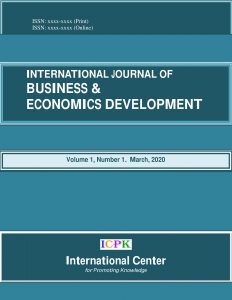The core of our commitment to the assurance of quality, integrity, and innovation in the research that we publish at ICPK is peer review. Peer review forms an essential step in the academic publishing process; this provides a systematic process of ensuring that work is sufficiently trustworthy, relevant, and novel. This page details the peer review workflow utilized at ICPK journals with the purpose of providing transparency and clarity for authors, reviewers, and readers.
To build trust, rigor, and progress in academic publishing, peer review in all ICPK journals—for example, the IJSPE, IJBED, IJLL, and IJHSS—sternly adheres to best practices of accepting expert review comments to enhance the research submitted.
Peer Review: What's It All About?
The peer review process during publication usually consists of reviews that are independent of an author. In other words, peer reviewing may have a number of goals: assessing the quality, novelty, and relevance of the research; providing constructive criticism that might help authors to improve; and ensuring that only credible and reliable research has been published.
At ICPK, we are committed to a thoroughgoing peer review pipeline in line with the maintenance of academic ethos, with a modern experience for authors and reviewers alike.
Peer Review Workflow at ICPK
Submission and Initial Screening
Authors submit their manuscripts through our convenient online submission management system. At this stage:
- Administrative checks: The format/layout, journal policies, and completeness of manuscripts are checked.
- Editorial evaluation: The editors check the field, novelty, and relevance of the manuscript to the journal scope.
Manuscripts that pass the initial screening go through peer review. Articles that do not meet the requirements of the journal are returned to authors with possibilities of resubmission.
Assignment of Reviewers
Once the manuscript has passed the initial screening, the editorial team selects reviewers based on:
- Expertise: The selected reviewers should be experts in their own area of research relevant to the manuscript.
- Conflict of Interest: We also ensure reviewers have no potential conflicts of interest, including no direct or indirect relations with the author.
- Availability: Reviewers are asked to participate based on the time available and time they are willing to commit to the review.
ICPK maintains a broad portfolio of reviewers to provide fair and unbiased reviews.
Peer Review Process
The ICPK journals mainly follow a double-blind peer review, in which:
- Blinding: The names of authors and reviewers are blinded to prevent any bias.
- Review Process: Reviewers evaluate manuscripts based on originality, methodology, significance, and ethical considerations.
Reviewers provide:
- Detailed comments: Strengths and weaknesses, aspects to improve.
- Recommendations: Decisions—accepted, revise, or reject.
Editorial Decision
Comments obtained are summarized by the editor and decisions are one of the following:
- Accepted: Manuscripts move directly to the production process.
- Minor revisions: Authors are requested to attend to certain comments before acceptance.
- Major Revisions: Authors are requested to make significant modifications and resubmit for a successive review.
- Rejection: Manuscripts that do not meet editorial standards or are outside the journal’s scope are rejected.
ICPK maintains openness in the review outcome. Authors are informed about the results with adequate detail.
Revisions and Resubmission
Authors with revision requests are assigned specific timescales for responding to reviewer comments. Critical features are outlined below:
- Detailed responses: Authors provide a point-to-point response to the reviewers’ comments.
- Re-review: The revised manuscripts are forwarded to the original reviewers for another review.
Final Acceptance
When a manuscript has fulfilled all the conditions, it is formally accepted in its current state for publication. The author is notified via an acceptance letter and the manuscript goes into production.
Proofreading and Publication
Production stage:
- Copyediting: Manuscripts are professionally copyedited for brevity and consistency.
- Proof Review: Authors review proofs for accuracy and finalize the publication process.
The article is then published online, indexed in related databases, and accessed globally.
Benefits of ICPK's Peer Review Workflow
- Thorough Quality Management: Ensures only high-quality, important results get published. Reviewers and editors critically evaluate articles.
- Constructive Feedback to Authors: Provides substantive comments to help authors improve their work.
- Transparency and Fairness: The double-blind review ensures objectivity.
- Timely and Efficient: Smooth workflow ensures no undue delays.
Ethical Considerations in Peer Review
ICPK follows best ethical practices in peer reviewing:
- Confidentiality: Manuscripts and review comments are kept confidential.
- Conflict of Interest: Reviewers and editors declare any conflicts of interest.
- Plagiarism Screening: All manuscripts undergo plagiarism screening to ensure originality.
Innovations in ICPK Peer Review
- AI-Assisted Reviewer Matching: Advanced algorithms identify the best reviewers.
- Reviewer Recognition Programs: Acknowledges reviewers’ work with certificates and public recognition.
- Transparent Peer Review: Considering publishing reviewers’ comments along with articles for more transparency.
Why Publish Your Research with ICPK?
- Credibility: Strict review standards ensure only accurate, high-quality research is published.
- ICPK Support: Authors receive support throughout the publication process.
- International Outreach: Journals are indexed in major repositories, enhancing visibility and outreach.
Review Application
Thank you for your interest in becoming a reviewer for our prestigious ICPK journals. Your experience and knowledge will play a very important role in maintaining the quality and high standard of our publications. Submission of the minimum requirements and completion of the application form for the application.
Minimum Requirements for Reviewers:
Academic Qualifications:
- Membership in a Master’s program in an appropriate major.
- Preferably, a PhD or equivalent professional experience.
Research and Publication Experience:
- A minimum of 3- to 5-years research experience in the related field.
- A history of published research papers in peer-reviewed journals.
Subject Matter Expertise:
- Deep subject matter knowledge and skills of the subject discipline to which the journal belongs.
- Up-to-date with current trends and developments in the field.
Peer Review Experience:
- Prior experience in reviewing academic manuscripts is preferred.
- Familiarity with the peer review process and ethical guidelines.
Availability:
- Capacity to dedicate time to manuscript review before specified deadlines.
